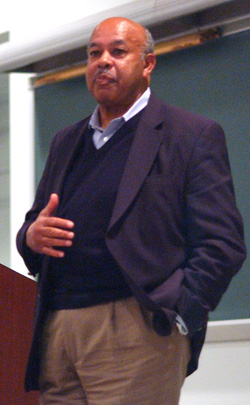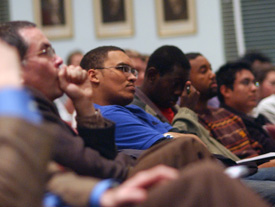As a liberal arts institution, the discussion of race is a preeminent topic in many of the different areas of study. From religion to literature, constitutional law to theatre, race seems to be an important theme that is historically rooted in the American story.
The Wabash Conservative Union hosted Ward Connerly, founder and chairman of the American Civil Liberties Institute and a leading advocate for elimination of race-based affirmative action. A packed Baxter 101 listened Thursday night to Connerly’s argument and engaged him afterwards with lively questions.
 "Every one of us is different," Connerly said. "We might be different in the sense of height, weight – some have more hair, some might have less. Skin color, eye color – we’re all different. Why then do we take that one characteristic – the amount of melanin in your skin - and say if you cross that line, if you have more of this and less of that you are ‘black’?
"Every one of us is different," Connerly said. "We might be different in the sense of height, weight – some have more hair, some might have less. Skin color, eye color – we’re all different. Why then do we take that one characteristic – the amount of melanin in your skin - and say if you cross that line, if you have more of this and less of that you are ‘black’?
Connerly argued that in any publicly funded institution, race should not be a mitigating factor in deciding anything from public school admission to contract decisions.
"I don’t have any choice about whether I belong to the government," Connerly said, "that’s not an option. Every April 15th you are required to repay your dues. If you don’t, the government comes looking for you. You are required to be a member of that entity and required to pay taxes. I would argue that the government should not make distinctions between us when it obligates us to join."
That argument was central to his most famous political win, the passage of Proposition 209 in California in 1996. Proposition 209 was an amendment to the California state constitution which made illegal any discrimination based on "…sex, color, ethnicity or national origin in the operation of public education, public employment or public contracting."
Similar laws have been passed in Washington state and Michigan. Connerly’s organization is promoting ballot initiatives in 5 other states that will make such discrimination illegal.
"I think it [Proposition 209] is consistent with the Equal Protection clause of the Fourteenth Amendment," Connerly said, "it’s consistent with the 1964 Civil Rights Act which was passed following a very tumultuous period in our history in which we fought hard for the principle of equal rights, equal treatment before the law."
"The initiatives I have promoted," he added, "have all been designed to move the ball up the field toward that beloved community that Dr. King talked about in which all of us would be treated equally without regard to the color of our skin, but based on our individual character as people and as members of God’s extended family."
 Connerly noted there is some nuance to the term ‘affirmative action’ and that he did in fact agree with certain definitions of affirmative action. He noted there was a difference between ‘race preferences’ and ‘affirmative action’ in the sense that one takes measures to prevent discrimination.
Connerly noted there is some nuance to the term ‘affirmative action’ and that he did in fact agree with certain definitions of affirmative action. He noted there was a difference between ‘race preferences’ and ‘affirmative action’ in the sense that one takes measures to prevent discrimination.
"There are some entities that practice affirmative action in a very good way," Connerly said, "in a very benign way. They are making sure they are not discriminating against anyone. They are looking at their job descriptions to ensure that there is no hidden bias in their job descriptions – that’s good affirmative action."
Connerly believes that those with lower socioeconomic statuses necessitate some preferential treatment in government because of their status.
There are still lots of low income people in our society," he said. "Some happen to be white, some Asian. Nobody has a monopoly on that and I think as a fair minded people we ought to be trying to help those who have not. "
"Affirmative Action in this instance makes sense," he said. "It is my hope that we will evolve from a race-based Affirmative Action to one that is more based on socioeconomic conditions because we cannot afford to have hordes of people standing on the sidelines feeling they are left out of this American system."
"I am hoping and pushing hard to try to get our society to move beyond race," he added, "but don’t forget those who need our assistance."
Reactions to Connerly’s talk were mixed.
"His ultimate goal of a fair and colorblind society was certainly appealing," said Kyle Cassidy ’08, "but he didn't have much more than anecdotal evidence to suggest that what he proposed doing was a positive step in that direction."
Dr. John Aden ’92, who asked a question during the question and answer portion of the talk, was frustrated by Connerly’s lack of historical grounding in his argument, but nonetheless welcomed the discussion.
"I think panoply of voices is important so that students can begin to formulate their opinions but I think what goes with that is scholarly engagement," Aden said, "you need to read very deeply to become a more informed contestant in these debates and to position yourself. I think that’s critical."
Wabash Conservative Union President Brandon Stewart ’08 was satisfied with not only the talk but the lively question and answer period that immediately followed.
"I was really happy with the event, Stewart said. "I thought he was a strong defender on the position that he took in race preferences. I think it was a good opportunity to have an open discussion on that when it’s such a charged issue in our society."
Photos by Elijah Sanders '10.